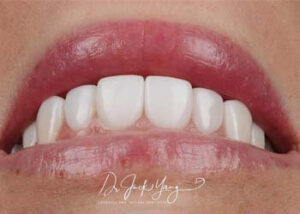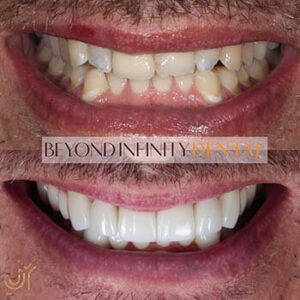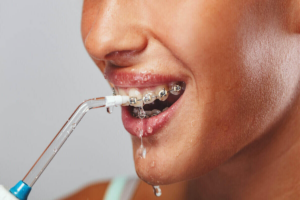When it comes to cosmetic dentistry, there’s no getting away from the fact that dental veneers are one of the most popular treatments available. In fact, it’s hard to find a social media influencer these days who isn’t sporting a set of porcelain veneers. But while the popularity of so-called ‘fake teeth’ is increasing, the truth is that quality porcelain veneers don’t come cheap. It’s understandable, therefore, that before committing to a smile makeover, many people want to ensure they get what they pay for. So, this begs the question, are veneers permanent?
Well, yes and no! And, while that seems like the answer given doesn’t help, don’t worry. In this post, we’ll set out to answer this question in detail, so by the end of the article, you’ll have a better idea of what you can and should expect if you decide to go ahead with cosmetic dental veneers.
So, are veneers permanent?
 Porcelain veneers are permanent in that they are fitted to your teeth. Consider this – veneers (otherwise referred to as dental laminates) are designed to cover the front of your existing teeth, thus hiding any blemishes, cracks, chips, or gaps.
Porcelain veneers are permanent in that they are fitted to your teeth. Consider this – veneers (otherwise referred to as dental laminates) are designed to cover the front of your existing teeth, thus hiding any blemishes, cracks, chips, or gaps.
So, not only do they need to look good, but they also need to be super strong. After all, you wouldn’t want to be chowing down on your favourite food to discover the dental veneer that should be on your tooth has now fallen out.
To avoid embarrassing situations, veneers are permanently attached to your teeth.
So how does a dentist do that?
In essence, the process involves removing a tiny sliver of your existing tooth enamel (approximately half a millimetre in thickness) to enable the false tooth covering to sit flush with the rest of your teeth. Remember, you’re aiming for a natural look and not something that sticks out like a sore thumb. Once sufficient enamel is removed, the porcelain veneer is permanently bonded to the tooth’s surface.
So what does this mean for the patient?
The reality is this, once you opt for cosmetic dental veneers and your dentist removes that enamel, there’s no going back. In other words, it’s a non-reversible treatment. If your veneers were to be removed, the chances are that any natural teeth covered by dental laminates would now be considerably weaker for it. So, in this respect, veneers are permanent, and you need to make sure they are suitable for you before you fully commit.
That said, there are other types of veneer that don’t involve any cosmetic changes to the teeth, and indeed, some are considerably cheaper, like composite veneers, but these aren’t as long-lasting and are typically not as durable.
Now we’ve discussed one aspect of how permanent dental veneers are; we should really talk about their longevity. In this respect, their permanency may depend upon several factors.
Habitual behaviours, lifestyle choices, and even medical conditions can all affect how permanent veneers are. For example, if you regularly bite your nails or chew on pen tops, it will wreak havoc with your porcelain veneers. Lifestyle choices like smoking will cause your veneers (just like natural teeth) to discolour, and while porcelain veneers are stain-resistant to a point, they will turn from a natural white to a yellow/brownish colour.
However, and this is a crucial point to remember, unlike natural teeth, porcelain veneers cannot be whitened. Therefore if you are a heavy smoker or regularly drink coffee or red wine, your veneers aren’t going to last as long as someone who consumes less stain-inducing foods and beverages. That is, of course, if you want to maintain a brighter, whiter smile.
 Finally, medical conditions like bruxism (the action of grinding and clenching teeth) is not conducive to having a set of porcelain veneers fitted. Even though they are designed to withstand regular biting forces, the act of night-time teeth grinding can cause bite forces far in excess of normal, everyday chewing. So if you do suffer from conditions like bruxism, your dentist should be able to get you help to bring the problem under control first.
Finally, medical conditions like bruxism (the action of grinding and clenching teeth) is not conducive to having a set of porcelain veneers fitted. Even though they are designed to withstand regular biting forces, the act of night-time teeth grinding can cause bite forces far in excess of normal, everyday chewing. So if you do suffer from conditions like bruxism, your dentist should be able to get you help to bring the problem under control first.
So, taking into consideration that you don’t smoke or grind your teeth at night and drink coffee or red wine in moderation, just how permanent are veneers then?
In reality, and with reasonable precautions, you can expect porcelain dental veneers to last somewhere between 15-and 20 years on average. Of course, that may be a lifetime for some people depending upon age, but others may find that they will need to replace their dental veneers several times during their life, and costs can mount, so this is something you should consider.
So there you have it. Hopefully, we’ve answered the question: are veneers permanent? And, also showed you that it isn’t as simple as a yes or no answer. While porcelain veneers are indeed permanent in a non-reversible treatment sense, they may or may not be permanent in a longevity sense, depending upon any number of factors.
One thing’s for sure, though, dental veneers provide a quick fix and effective solution to those people who aren’t happy with their current smile. In the right skilled hands, cosmetic porcelain veneers can dramatically transform a patient’s smile, self-confidence, and overall well-being, and that has to be something to smile about!
If you’re considering cosmetic porcelain veneers and would like to discuss your options come and talk to the team at Beyond Infinity Dental – Dr Jack Yang customises bespoke dental veneers to give you a beautifully balanced and totally unique smile. Call for an appointment at (02) 8806 3799 or book online for a smile consultation today. We look forward to helping you create your smile.
References
The Atlantic.com – Why Does Everyone Suddenly Have Fake Teeth?
https://www.theatlantic.com/health/archive/2019/02/dental-veneers-instagram-teeth-teeth-teeth/582010
Healthline.com – Everything You Need To Know About Composite Veneers
https://www.healthline.com/health/composite-veneers
UPM.es – Diagnosis of Bruxism Based on polymeric Piezoelectric Sensors and Remote Communication
http://www.disam.etsii.upm.es/barrientos/Publications_files/ICIT%202010%20Diagnosis%20of%20Bruxism%20Based%20on%20Polymeric%20Piezoelectric%20Sensors%20and%20Remote%20Communication.pdf









